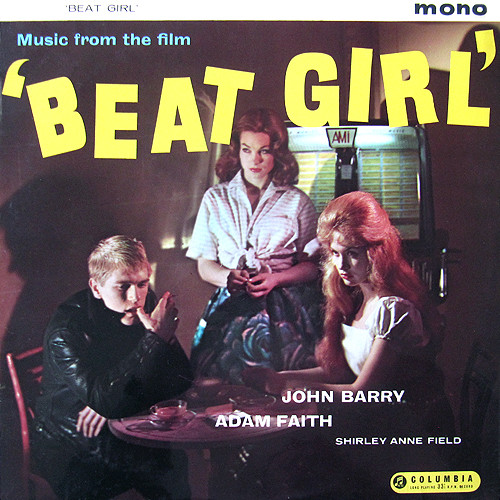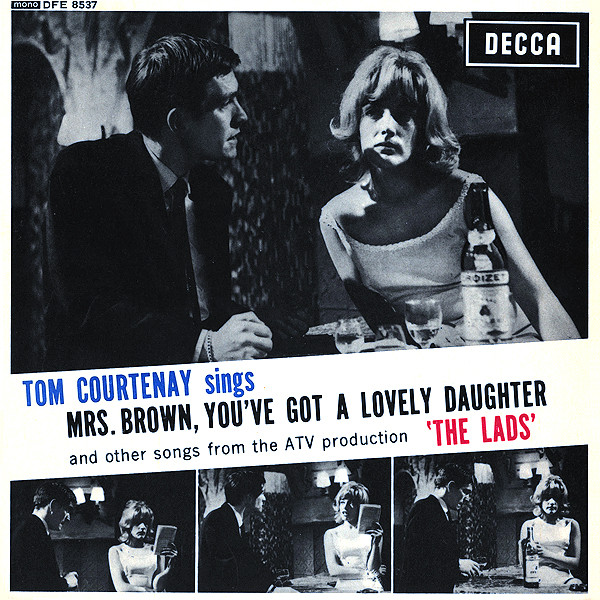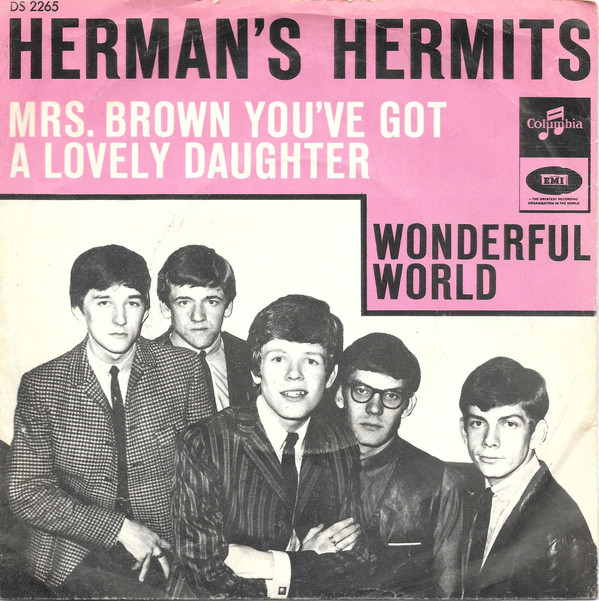
Trevor Peacock

Following his death on Monday, Novelty Jukebox looks at the lesser-known but extremely successful songwriting career of The Vicar Of Dibley actor Trevor Peacock.
Trevor Peacock was many things during the course of his long and successful career. He was a stage actor of some note who appeared in a number of Shakespearian classics for The RSC, as well as in television adaptations for the BBC. He was a member of the 69 Theatre Company in Manchester, and later in the 1970s also a key member of its successor The Royal Exchange Theatre, writing and performing in plays for them both. His later role as Jim Trott in The Vicar Of Dibley from 1994 onwards would bring him enduring fame as a sitcom star, with a well-known and popular catchphrase to boot, but Trevor Peacock also made an impact in the world of music as a librettist, composer, and successful pop songwriter.
Born in 1931 in Edmonton, North London, the young Trevor Peacock would spend a lot of his formative years in church services, assisting his father who was the local organist. There he gradually learnt his future musical skills by singing and absorbing the ecclesiastical tunes as he attempted to keep the church organ well pumped and full of air. Leaving school at the age of 18, after a not too successful trial for Tottenham Hotspur, he decided to pursue a career in the theatrical arts. Like so many aspiring performers of his generation, Trevor Peacock found employment at the Windmill Theatre in 1956 as a comedian, writing and performing his own material.
Early the following year, in February 1957, with rock and roll becoming a youth phenomenon that even the stuffy old BBC could no longer ignore, Trevor Peacock was gifted a break as a writer on the broadcaster's brand new youth TV show Six-Five Special. It was a fortuitous move for his career.
He was initially employed to write a series of spoof songs and humorous interpretations of fledgling rock classics for the presenters Josephine Douglas and Pete Murray to perform alongside the bona fide rock acts appearing on the show. It was as part of these regular writing duties that Peacock was eventually tasked to come up with a song for the presenters to perform with former boxer and sometime actor Freddie Mills. Thanks to the wiping of most of those early shows, that particular song - We're The Cockiest Rockers In Town - is now sadly lost to history, but its merits proved enough for the show's producer to offer Peacock a then quite substantial 40 guineas a week (£42) for the remainder of the show's run, considerably more than the £26 a week that Pete Murray was earning as a presenter!

With his skills as a composer and lyricist honed by the demands of the weekly show, it was no surprise that Peacock soon made the leap from spoof pop songwriter to actual pop songwriter. His big break came from John Barry, who in 1959 was presented with the job of composing the soundtrack for the forthcoming Adam Faith teen exploitation film Beat Girl. A sensational and lurid tale of strippers, teddy boys, disenchanted beatniks, casual violence, jazz, and rock in the seedy streets of 1950s Soho, the film was censor bait from the outset and would in due course earn an X certificate despite substantial cuts, with its release being delayed until 1960.
Performing well despite condemnations from the press and a number of poor reviews, its notoriety certainly helped at the box office, and it also did much to help the popularity of the Adam Faith-led soundtrack. The LP Music From The Film Beat Girl, released as a film tie-in, made it the first British-made film to be blessed with a vinyl soundtrack album release. An Adam Faith single Made You, written by Barry and Peacock, was scheduled for release before the notoriety of the film and the song's 'suggestive' lyrics caused the BBC to ban it.
Made You enjoyed a limited European release but the sordid saga of Beat Girl was not enough to deter the young Peacock, who continued to work on further songs with Barry and pop icon Faith. Indeed, the success of Beat Girl earnt Trevor a solo 1961 release on Decca, I Didn't Figure On Him (To Come Back). Despite possessing considerable vocal ability, his Adam Faith-like crooning, and slightly more rockier efforts of the B-side did not make for chart success. For many people that would have been enough, but fate had other ideas.
The Lads was a 1963 television play produced for ITV's London weekend and Midlands weekday broadcaster ATV. Set in a small town near a British army base in the Mediterranean, the play was written by Ronald Harwood and starred Tom Courtenay, at that time enjoying immense success and acclaim in films such The Loneliness Of The Long Distance Runner and Billy Liar. Also appearing as an actor in the cast was Peacock, who was called on by the producers to provide authentic sounding pop ditties for the soundtrack. The songs in fact became an integral part of the action, sung as the young male characters spend a night on the town, searching for love before military manoeuvres begin the next day.

Performed for that TV play by the ensemble cast, four of the songs were released on a 1963 soundtrack EP performed by star Tom Courtenay, and later as a single. The lead song and A-side of the single was the popular and chirpy number Mrs. Brown You've Got A Lovely Daughter, which is one of those rare compositions that achieves the effect of sounding like a pop standard that has been around for decades. A chirpy, light-hearted tale of teenage longing, neither the EP nor the single was a hit for Courtenay, who soon gave up on becoming a pop idol in order to concentrate on his much more successful career as an actor.
And there the tale of Mrs. Brown You've Got A Lovely Daughter may have ended, were it not for Manchester pop group Herman's Hermits. With their success the previous year with the Goffin and King-penned single I'm Into Something Good, 1965 saw the quintet race to release a follow up hit, as well a first full album of songs.
Without wishing to denigrate either the group or producer Mickie Most, by early 1965 they were struggling: a 1910 music hall song I'm Henery The Eighth, I Am, made famous in the halls by Harry Champion, had been dusted down and pressed into service, but their debut LP was still a song short. In desperation, Most turned to his friend - Trevor Peacock - who, rather than write a bespoke number, passed him Mrs. Brown You've Got A Lovely Daughter, thinking it a suitably short, inoffensive and happy song with which to end the album.
Perhaps astonishingly, both songs would rocked to the number one spot on the highly competitive and lucrative US Billboard chart.
Attempting to explain the massive success of either, never mind both, is a difficult ask. In a US chart, then dominated by English groups such as The Rolling Stones (who were knocked from #1 by I'm Henry VIII, I Am) and The Beatles amidst the "British invasion", the success of Herman's Hermits as a band was not wholly unexpected; but to see Mrs. Brown You've Got A Lovely Daughter (MGM K13341) and its follow-up release both topping the charts in America (as well as many other countries) was certainly a surprise.
What were essentially throwaway album fillers quickly proved much-loved and immensely popular hits, their lack of pretension and seriousness perhaps striking a chord in the midst of all those bands who were trying just that bit harder to be authentic, serious, meaningful and original. The songs themselves sound like joyous Cockney singalongs that would not be out of place led by a drunk jigging on a pub table. No mean feat for a bunch of likely lads from Manchester! The same liking for authentically unabashed British silliness that would later make global megastars out of Benny Hill and the Monty Python team is there in embryonic form in the sunny jaunty performances of Peter Noone and his band.

Trevor Peacock would keep writing and composing for the rest of his career, alongside a plethora of other creative endeavours. There were some near misses and some other notable success. He would for instance collaborate again with Barry on the soundtrack for Goldfinger before Peacock's desperation at finding suitable rhymes (finger, linger, winger, singer...) saw Leslie Bricusse and Anthony Newley brought in instead, much to his relief.
In the days when anything from Liverpool was instantly and inherently cool and happening, Peacock would also provide chart hits such as Funny All Over for the Vernon Girls, a female vocal ensemble of workers for the Liverpool-based football pools company, Vernons' Pools. Peacock would also reunite with Tom Courtenay for the soundtrack of the 1982 West End musical Andy Capp, which he wrote with the show's star, Alan Price.
While the village of Dibley has, in Jim Trott, lost one of its most loyal if somewhat eccentric and lascivious members of the parish council, the world of pop and novelty record has lost one if its more interesting, accomplished, skilled and artistically diverse polymaths. Trevor Peacock led a full life that should be justly celebrated.
Help us publish more great content by becoming a BCG Supporter. You'll be backing our mission to champion, celebrate and promote British comedy in all its forms: past, present and future.
We understand times are tough, but if you believe in the power of laughter we'd be honoured to have you join us. Advertising doesn't cover our costs, so every single donation matters and is put to good use. Thank you.
Love comedy? Find out more